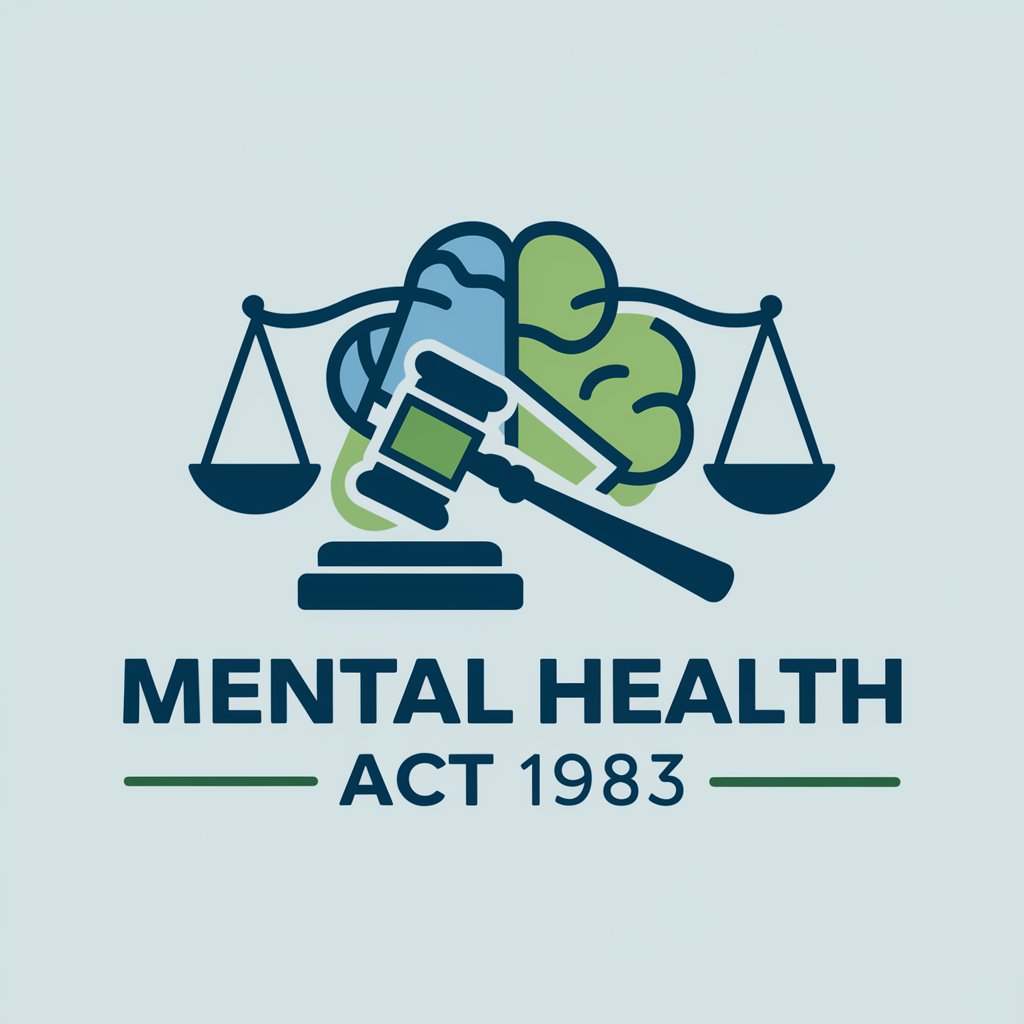Mental Health Act 1983 - Mental Health Act Guide

Welcome! How can I help you understand the Mental Health Act 1983 today?
Simplifying Mental Health Law
What are the key provisions of the Mental Health Act 1983?
How does the Mental Health Act 1983 define mental disorder?
What are the rights of patients under the Mental Health Act 1983?
Can you explain the process of compulsory admission to a hospital under the Mental Health Act 1983?
Get Embed Code
Introduction to Mental Health Act 1983
The Mental Health Act 1983 is a key piece of legislation in England and Wales that provides the legal framework for the treatment and care of individuals with mental health conditions, particularly when treatment is provided without their consent. It consolidates previous laws relating to mentally disordered persons and aims to ensure the safety and well-being of both the individuals affected and the public. Examples include the procedures for compulsory admission to hospital for treatment, guardianship provisions, and ensuring the rights of individuals to appeal against their detention. Powered by ChatGPT-4o。

Main Functions of Mental Health Act 1983
Compulsory Admission for Assessment and Treatment
Example
A person can be detained under the Act for assessment (Section 2) or for treatment (Section 3) if they are suffering from a mental disorder of a nature or degree warranting their detention for health or safety reasons or for the protection of others.
Scenario
An individual demonstrating severe psychotic symptoms and posing a risk to themselves or others may be admitted to hospital for assessment and subsequently for treatment, without their consent, to ensure their safety and provide the necessary care.
Guardianship
Example
Under Section 7, the Act allows for the appointment of a guardian for a person suffering from mental disorder, to ensure their welfare and protect them and others, by making decisions about their living arrangements and care.
Scenario
A young adult with severe learning disabilities and unable to make decisions about their living arrangements or care may be placed under guardianship to ensure they live in a suitable environment and receive appropriate support.
Aftercare
Example
Sections 117 provides for aftercare services to be provided free of charge to individuals who have been detained under certain sections of the Act, to support their recovery and reintegration into the community.
Scenario
After being discharged from hospital following compulsory treatment, a person is provided with community-based support services, such as therapy and housing assistance, to aid in their recovery and prevent re-admission.
Ideal Users of Mental Health Act 1983 Services
Individuals with Mental Health Conditions
Persons experiencing severe mental health issues that may lead to harm to themselves or others, and who may need assessment, treatment, or care under compulsion for their own safety and wellbeing.
Healthcare Professionals
Psychiatrists, mental health nurses, social workers, and other professionals involved in the assessment, treatment, and care of individuals with mental disorders, utilizing the provisions of the Act to provide necessary interventions.
Legal and Advocacy Groups
Organizations and individuals advocating for the rights and welfare of persons with mental health conditions, ensuring the Act's provisions are applied fairly and individuals' rights are protected.

Using Mental Health Act 1983: A Step-by-Step Guide
Begin a Free Trial
Start by accessing mental health resources online without the need for a subscription or login, such as visiting yeschat.ai for a free trial.
Understand the Act
Familiarize yourself with the Mental Health Act 1983, focusing on key sections relevant to your needs, whether you are a healthcare professional, patient, or caregiver.
Identify the Need
Identify the specific provisions of the Act applicable to the situation, such as conditions for compulsory admission, rights of patients, or guidelines for treatment.
Follow Procedures
Ensure adherence to the procedures outlined in the Act for any action, whether it involves admission, treatment, or guardianship, always in accordance with legal requirements.
Seek Professional Advice
While gaining an understanding of the Act is crucial, consult with legal or healthcare professionals for interpretations or actions under the Mental Health Act 1983.
Try other advanced and practical GPTs
EU AI Act
Navigate AI Compliance with Ease

Cyber Threat Hunting and Detection Engineering
AI-powered Threat Hunting Expert

Drug Hunting
AI-powered precision in drug discovery

Job Hunting Assistant
Elevate Your Job Search with AI

Will Hunting
Bridging Quantum Mechanics and Relativity with AI

Hunting Buddy
Empowering Ethical Hunting with AI

ACT-Node
Powering insights with AI

AI Act Classifier
Navigate AI compliance with precision.

EU AI Act Compliance Checker
Navigating AI Compliance Effortlessly

Anger Insight Assistant
Uncover and manage anger with AI.

Anger Master
Master Your Anger with AI-Powered Coaching

Angel Investor
Empowering Startups with AI-Driven Insights

Q&A on Mental Health Act 1983
What is the main purpose of the Mental Health Act 1983?
The primary purpose of the Mental Health Act 1983 is to provide legislation for the assessment, treatment, and rights of people with mental health disorders, particularly when they cannot make decisions for themselves.
How is 'mental disorder' defined in the Act?
Under the Mental Health Act 1983, 'mental disorder' is broadly defined to cover any disorder or disability of the mind, which can range from mood disorders to more severe conditions.
What are the criteria for compulsory admission under the Act?
Compulsory admission requires that the individual is suffering from a mental disorder that warrants detention for assessment or treatment and is necessary for their own health and safety or for the protection of others.
Can patients appeal their compulsory detention?
Yes, patients have the right to appeal their detention under the Act, typically through a Mental Health Tribunal, to challenge the legality of their detention.
What role do approved mental health professionals play under the Act?
Approved mental health professionals have critical responsibilities, including assessing individuals for possible detention under the Act and coordinating care and treatment plans while ensuring legal and ethical standards are met.
